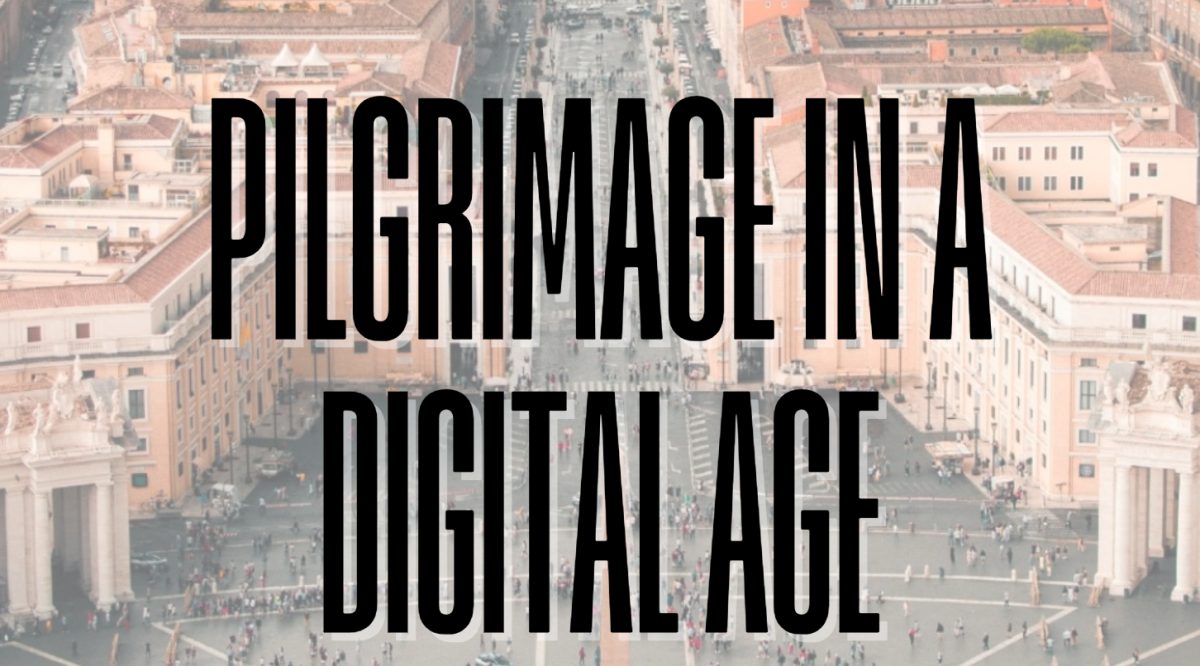Squeezed between millions of fellow pilgrims on the streets of Rome, sharing a meal at a table where I was the only English speaker and falling asleep in a room full of strangers: These were the kinds of experiences that shaped my summer. I had the rare gift of walking the Camino de Santiago with two of my closest high school friends and later joining Fordham University’s delegation at World Youth Day in Rome. To go on even one pilgrimage is a privilege that many never get in their lifetime, and I am profoundly grateful to have experienced two back-to-back. At first, I worried I would be so focused on taking care of myself and my friends that I’d have no room left for reflection or discernment. Yet I’ve come to realize that, especially in our digital age, the physicality of a pilgrimage is more important now than ever.
Pilgrimages reveal that the body is not separate from discernment but essential to it. The body is a vessel to help young people uncover their deepest desires and form genuine connections with others in a world saturated by digital distractions. To gain further insight into the Jesuit tradition of discernment, I spoke with the Vice President of Mission Integration and Ministry, Fr. John J. Cecero S.J., sharing with him my sentiment that it seems nowadays the youth are struggling to discern their desires for the future and overlooking the importance of the body. He pointed me towards a central element of Saint Ignatius of Loyola’s Spiritual Exercises: the “application of the senses. Ignatius insists on engaging sight, sound, touch, even smell, when praying with scripture, because it is through the imagination and the senses that we discover what we most deeply desire.” Pilgrimage embodies this truth. Walking for miles, sweating in the heat, carrying our tiredness and sharing meals along the way — all these physical realities force us to listen to our bodies and pay attention to our longings.
In our current age, though, pilgrimages seem to be overlooked by the misconception that our devices allow us to reach the world at the palms of our hands. Yet, this engagement becomes shallow, filtered and mediated. Think of how many of us miss even the quiet beauty of our own Rose Hill campus. The numerous spaces that cultivate peace and a sense of togetherness, through the simple beauties of life, are frequently ignored, even though they were created for us to not only notice but reflect upon. Pilgrimages counteract this trend by requiring participants to step away and fully immerse themselves in the present. With this in mind, I wanted to share a brief collection of voices from past pilgrims, reflecting on how stepping away from technology and into the physical world shaped their experiences.
My friend and co-Camino pal, Ali Sutton, who is a junior at Ohio University’s School of Nursing, shared, “While it helped to have friends there, it was really me in my own head that got me through each day … getting out there and seeing the world through your own eyes and not over screens is something technology could never compete with.” Her words highlight how pilgrimage brings you face-to-face with yourself, something that can’t be outsourced to distraction or technology. Anna-Marie Pacione, FCRH ’26, reflected on her experience at World Youth Day in Lisbon saying, “being there with so many pilgrims, I began to understand the Body of Christ in the most expansive, vast way.” The Church is “so scattered and yet so tightly gathered together,” she said. Her reflection points to the embodied reality of faith, that simply showing up, shoulder to shoulder, creates a sense of belonging that no online gathering can replicate. Lastly, Augustine Preziosi, FCRH ’23, MTS ’26, who went to the past two World Youth Day Pilgrimages, shared that “the physical demands of pilgrimage teach you patience, attentiveness and the way your body can lead your heart and mind toward reflection. I saw this same rhythm of embodied learning in both Lisbon and Rome, and it reminded me that true discernment isn’t only a matter of thought, it’s felt through every step you take.”
Finally, from my own experience, I have now come to believe that the beauty of pilgrimages is in the humility you will encounter. This virtue is one that is hard to find across the many digital platforms we have the choice of interacting with each day. Yet, to truly understand the deepest desires of oneself, especially when discerning career, vocation or relationships, the mind must lay down its pride and permit the body to become an active component. This allows us to fully feel and reflect on our exhaustion, attraction, joy and sorrows, seeing them embodied in the physical experience of a pilgrimage.
Gabby Chinnici, FCRH ‘27, is a history major and music minor with a concentration in American Catholic Studies fromNaperville, Illinois.






































































































































































































